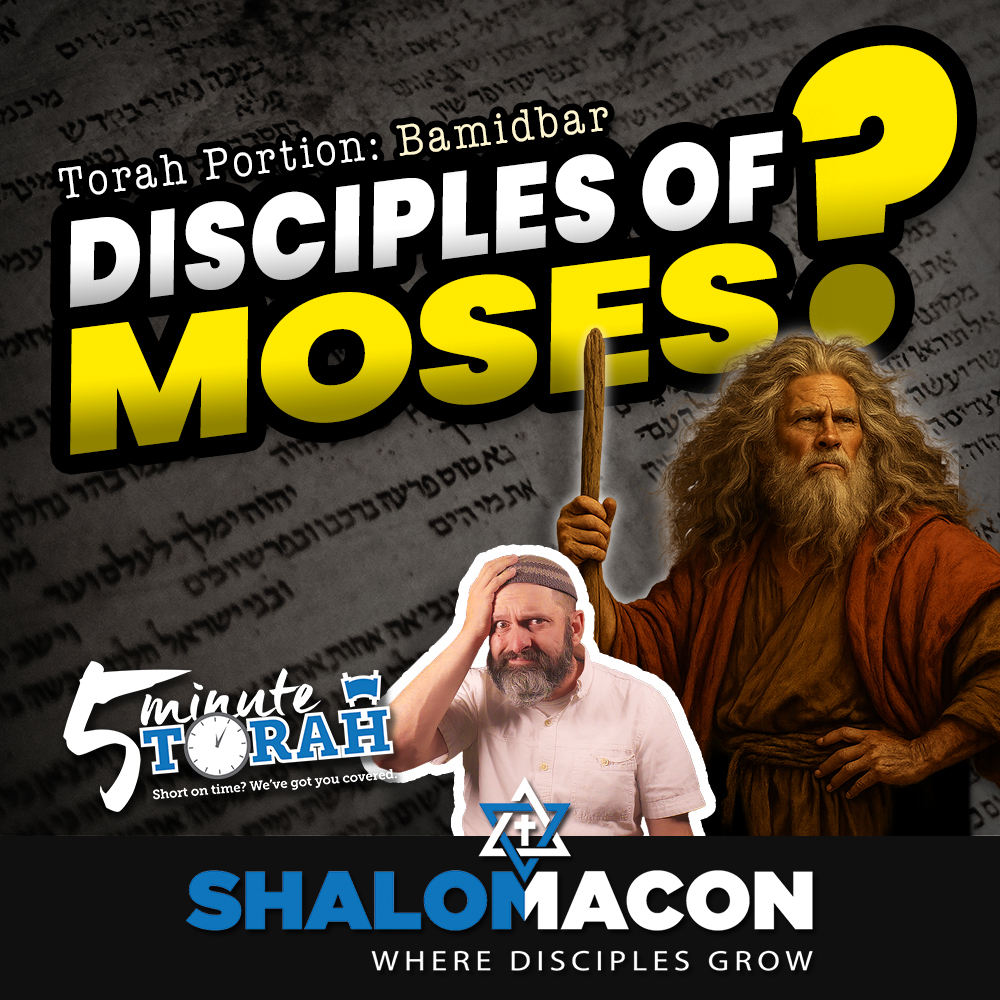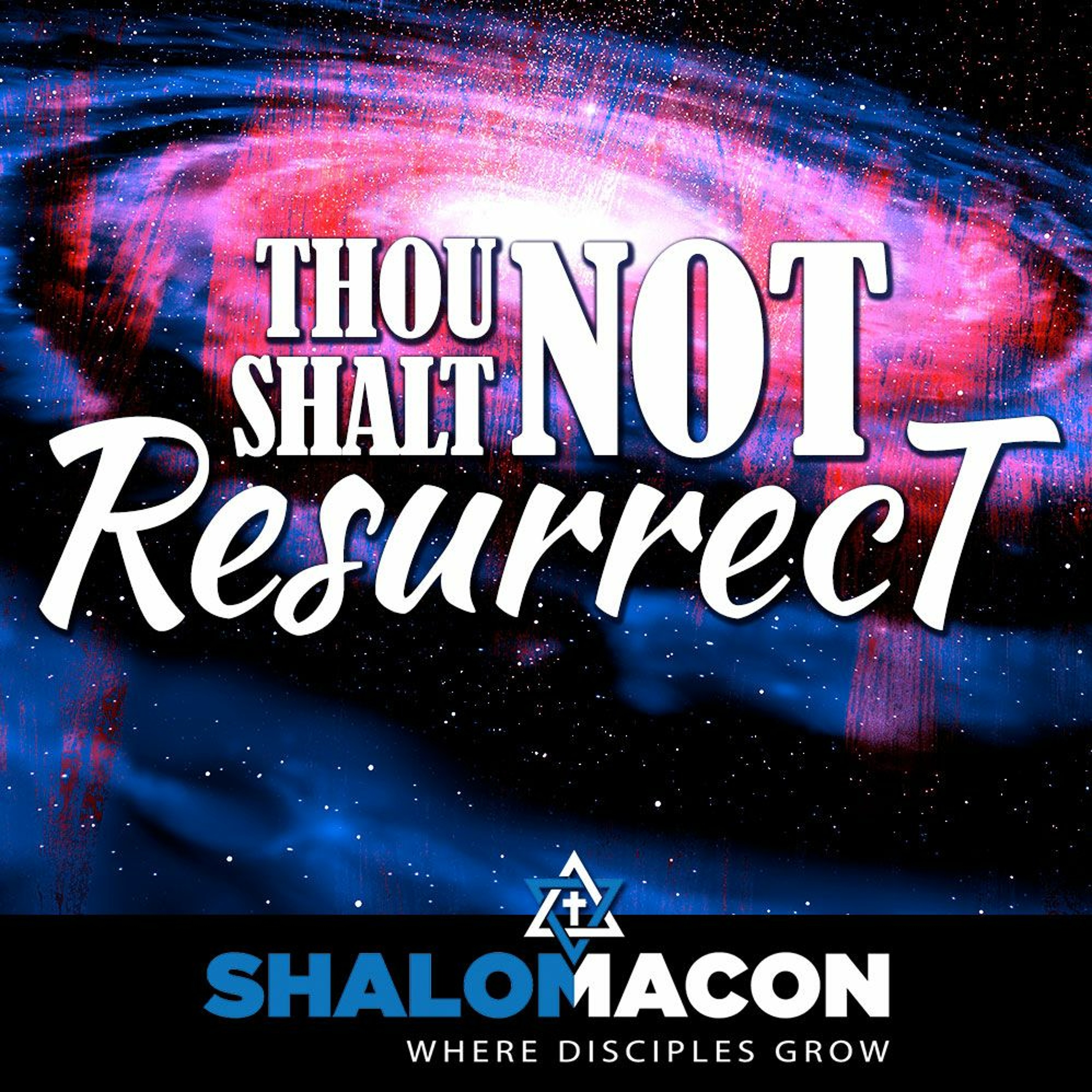Episode Transcript
[00:00:00] Speaker A: I'm a disciple of Peter. I'm a disciple of Paul. I'm a disciple of Barnabas. I'm a disciple of John.
I'm a disciple of Timothy. I'm a disciple of Akula. I'm a disciple of Moses. What?
Well, if you're confused and want to find out what's going on, then join me for this week's 5 Minute Torah Shalom and Blessings from Shalom Macon, the place where disciples of Yeshua learn, connect and grow. I'm Darren and before getting into the five minutes of my five Minute Torah commentary, let's cover a few quick facts about this week's Torah portion. This week we are beginning the Book of Numbers. We are studying the 34th portion, the portion of Bamidbar numbers 11 through 420 and here are the three things that you need to know about it. Number one Israelite census gathering the Troops the Torah portion, Bami Bar begins with a detailed census of the Israelite men eligible for military service, specifically those age 20 and above, conducted in the wilderness of Sinai. This census serves multiple purposes. It establishes the total number of fighting men, organized the Israelites for efficient movement and defense, and reinforced the sense of order and structure within the Israelite camp. The census, led by Moses and Aaron, with the help of the tribal leaders, counted each tribe individually, showing the importance of each tribe's contribution to the whole. This process not only prepared the Israelites for their journey and potential conflicts ahead, but also strengthened their identity as a unified people under God's covenant, preparing them for the challenges of entering the Promised Land.
Number two Holy Responsibility the Role of the Levites in the Torah Portion of Bami Bar the Levites are designated for special roles related to the care, transportation and the service of the Mishkan or Tabernacle. Unlike the other tribes, the Levites are not included in the general census for military service. Instead, they're set apart for religious duties, their responsibilities included in assembling and disassembling the Tabernacle during the Israelites journeys and safeguarding its holy furnishings. Their job may have been mundane on one level, but it was incredibly important on many others. Their service made it possible for the proper function of the Tabernacle as well as its sanctity. Remaining unsoiled the service of the Israelites was crucial to the connection between God and His people and Number three Pidion Haben, Redemption of the Firstborn Although the Torah has briefly mentioned the redemption of the firstborn previously, obviously it is not until our current Torah portion that we learn about what this means. In the book of Exodus, we learn that all the firstborn males of Israel were consecrated to God in commemoration of God, sparing the firstborn of Israel while striking down those of Egypt. In Bamidbar, God commands the Levites to be taken as substitutes for the firstborn of Israel, dedicating them to serve in the tabernacle. Then a census of the firstborn males and the Levites is conducted and and any surplus of firstborns over Israelites is redeemed with a monetary payment. This act of redemption is a constant reminder that all firstborn Israelites belong to God, the one who is the ultimate giver of life. Are you a disciple of Yeshua? There are a lot of people who.
[00:03:17] Speaker B: Say they are, but when it comes down to it, they really don't even know what it means to be a disciple. Why? Because discipleship is a concept unique to Judaism. It it's an intimate relationship between a rabbi and his student.
[00:03:30] Speaker A: Yeshua called 12 men to be in.
[00:03:32] Speaker B: His inner circle of discipleship, and those 12 men changed the world. What did they know about being a disciple that we don't? I wrestled with this question when I wrote my book, the Four Responsibilities of a Disciple.
[00:03:44] Speaker A: There were a ton of books already.
[00:03:46] Speaker B: Written on how to make disciples, but I wanted to know what it meant to be a disciple because it seems that all, all of these disciples that.
[00:03:55] Speaker A: Were being made in our day really.
[00:03:56] Speaker B: Weren'T having an impact on the world around them like they should.
[00:03:59] Speaker A: I found out that there were four.
[00:04:01] Speaker B: Responsibilities every disciple should know and that when implemented, living out these four responsibilities has the potential to change the world. If you want to know what it means to be a true disciple of our master Yeshua, then check out my book, the Four Responsibilities of a Disciple, using the link below.
[00:04:17] Speaker A: This week's Torah commentary is called Disciples of Moses, and it comes from a book, 5 Minute Torah, Volume 3.
The Torah portion of Bammara begins our study of the Book of Numbers. Chapter one starts off with the Lord's command to take a census of the males among the children of Israel who are of the age to go into battle. Every male, 20 years old and older were to be counted. The Torah then lists out the census results according to each tribe. In chapter two, after giving the results to the census, the Lord gives Moses instructions for how the children of Israel would both encamp and travel the Tabernacle. And the Levites would be surrounded by the entire army of Israel. The tribal legions would be a buffer of protection for both the priestly tribe and the holy house in the event of a military engagement. Chapter three, however, begins entirely different. These are the generations of Aaron and Moses at the time when the Lord spoke with Moses on Mount Sinai. These are the names of the sons of Aaron. Nadab, the Firstborn, and Abihu, Eleazar and Itamar. These are the names of the sons of Aaron, the anointed priests whom he ordained to serve as priests. This is Numbers, chapter three, verses one through three. Chapters three and four of the Book of Numbers cover the responsibilities of the Levites for packing up and transporting the tabernacle and its furnishings when traveling. However, the Torah introduces this topic in a very unique manner. It begins by saying, these are the generations of Aaron and Moses. In the original Hebrew, the word for generations is toldot. As I've previously discussed, the primary meaning of the word Toledot is offspring. But in this case, why does the Torah discuss the sons of Aaron but it's completely silent regarding the offspring of Moses? Rashi, referencing the Talmud's interpretation of this passage in Sanhedrin 19B, has a beautiful answer to this troubling question. He says that the Lord considers the sons of Aaron to also be the sons of Moses because he has taught them Torah. Because the sons of Aaron were in a way, disciples of Moses, he became a type of spiritual father to them. This scriptural principle is extended to say that whoever teaches Torah to the son of his friend is considered as if he had fathered him. And sometimes a teacher may even take precedent over a physical father because a person's physical father brought him into this world. But his teacher was who taught him. The wisdom of the Torah brings him to life in the world to come. This is from Bammamentsia 33AMany adults in this world have never and will never be able to raise physical children of their own. This chronic situation can be devastating. It can lead to bitterness, depression, and complete lack of purpose to life. The late Chabad Rebbe Menachem Mendel Schneerson, of righteous memory, and his wife Haye Mushka, were never able to bear children. Although hundreds if not thousands of people prayed for them to be able to bear natural offspring of their own, the vision was never fulfilled physically. However, the Rebbe is to this day one of the most influential Jewish figures in history.
And although he had no physical children of his own, thousands of people across the world identified him as their spiritual parent. His life and teachings have affected millions of people around the world for almost three quarters of a century. His state of barrenness did not limit his ability to invest in disciples and give birth to more spiritual descendants than he could ever have been able to physically. Yeshua of Nazareth is an even more extreme example. Although he had no physical children of his own, unless you believe the conspiracy theories of the likes of Dan Brown and others, he has given life to literally billions of children over the last 2000 years. His spiritual family will continually grow in numbers because he calls us to to continue to produce spiritual offspring for him. Neither the Rebbe nor Yeshua had the limiting belief that they could not bear children. They simply had a different perspective that we would do well to imitate. Although our physical children should be our first and primary responsibility to disciple and teach the Scriptures, we should keep in mind that we also have the opportunity to be spiritual parents to others. Because we are called to raise up disciples teaching them all that Yeshua has taught us, we we have the opportunity to create spiritual offspring numbering thousands of times greater than what we can produce simply through our physical offspring. If you feel that your child rearing days are over, or if you have not had the privilege to raise children of your own, you still have an opportunity to turn a barren womb into a fertile environment for birthing spiritual offspring. As it says, he gives the barren woman a home, making her the joyous mother of children. Psalm 113, verse 9. Once again, if you want to understand how Rabbinic literature helps us better understand the teachings of Yeshua, then you need to check out my video series called Perkei Avot and the Teachings of Yeshua. It's based on a Rabbinic text called Perkei Vot, also known as Ethics of the Fathers, and compares the teachings within it to the teachings of Yeshua. You should check it out. It will revolutionize the way you look at both Rabbinic literature and the teachings of our Master. Just click on the link right here to get started.



